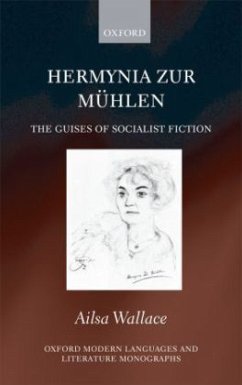This book undertakes a critique of Hermynia Zur Mühlen's prose fiction. It uses her biography and contemporary literature as a context for analysing the content and form of her work, and traces continuities and changes in her treatment of political, social, religious, and gender issues. To date, critics have mostly treated Zur Mühlen in terms of her sensational biography or as an author of socialist fairy tales or exile literature. A full investigation of her work in
different genres has been hindered by traditional prejudices about the canon, high art and popular culture and politics. The study begins with Zur Mühlen's writing in the Weimar Republic. The first section examines her Märchen, Krimis, Mädchenliteratur and autobiography in the context of left-wing literary debates
and contemporary inter-war literature. It shows how Zur Mühlen viewed literature primarily as a political tool and sought to appropriate popular forms of literature to convey socialist ideas to a wide and varied audience in an entertaining fashion. The second section is devoted to Zur Mühlen's writing in exile. It discusses Zur Mühlen's early exile fiction written on arrival in Austria, and argues that Zur Mühlen's attitudes were defined by anti-fascism and her
disillusionment with Communism. By tracing continuities and changes in her treatment of social, religious, and gender issues from earlier works, we can assess how exile impacted on her writing and obliged her to experiment with new forms and genres and to recycle old material. It goes on to investigate Zur Mühlen's 'Austrian Forsyte
Saga' and how her conception of it changed in the light of the collapse of central Europe at the end of the 1930s and further exile.
different genres has been hindered by traditional prejudices about the canon, high art and popular culture and politics. The study begins with Zur Mühlen's writing in the Weimar Republic. The first section examines her Märchen, Krimis, Mädchenliteratur and autobiography in the context of left-wing literary debates
and contemporary inter-war literature. It shows how Zur Mühlen viewed literature primarily as a political tool and sought to appropriate popular forms of literature to convey socialist ideas to a wide and varied audience in an entertaining fashion. The second section is devoted to Zur Mühlen's writing in exile. It discusses Zur Mühlen's early exile fiction written on arrival in Austria, and argues that Zur Mühlen's attitudes were defined by anti-fascism and her
disillusionment with Communism. By tracing continuities and changes in her treatment of social, religious, and gender issues from earlier works, we can assess how exile impacted on her writing and obliged her to experiment with new forms and genres and to recycle old material. It goes on to investigate Zur Mühlen's 'Austrian Forsyte
Saga' and how her conception of it changed in the light of the collapse of central Europe at the end of the 1930s and further exile.

